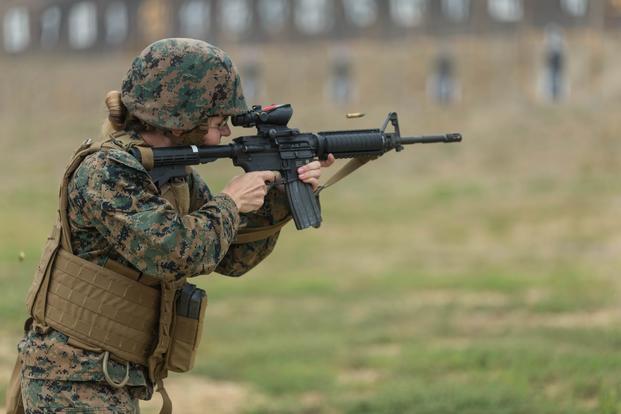In an effort to improve combat marksmanship dramatically, Marine Corps officials are working on a new set of standards for the service’s three marksmanship skill badges.
So far, one thing is clear -- the new standards won’t be easier.
“Marines are going to have to truly earn those coveted crossed rifles that indicate an expert marksman,” Col. Howard Hall, commander of the Weapons Training Battalion at Quantico, Virginia, told Military.com.
The new scoring standards for the Corps’ marksman, sharpshooter and expert badges are part of an ambitious plan to replace the current Annual Rifle Training (ART) qualification course with the new Annual Rifle Qualification (ARQ) – a challenging new course of fire that will force Marines in the operational force to draw on the basic marksmanship skills they learned in initial-entry training and apply them in a realistic assessment designed to measure how lethal they really are.
If approved in 2021, the ARQ will consist of a three-day course that involves day and night qualification against modern silhouette targets with lethal zones in the chest and head, rather than outdated bullseye-style targets. Marines will qualify in full combat gear, firing at an array of stationary and moving targets from distances ranging from 15 to 500 yards.
“It’s a more difficult test, there is no doubt about it,” Hall said.
The Marine Corps marksmanship community drafted the new ARQ course of fire in October 2018 at the annual Combat Marksmanship Symposium, recognizing that “it was an operational necessity to focus on lethality instead of marksmanship,” Hall said.
So far, the Marine Corps has validated the ARQ with scores from 226 Marines across the force who went through the course in fiscal 2019.
While the sample was not large enough to represent the entire Marine Corps, it provided Marine Corps Operational Test and Evaluation Activity enough data to make an objective assessment so the effort could move forward, Hall said.
“It validated the course of fire, it validated our testing methodology and it validated ARQ as a viable test,” Hall said.
Phase Two testing will include 600 Marines from ground, aviation and logistics combat elements with representative samples of ranks, military occupational skills and gender, Hall said.
The results will be briefed at the Combat Marksmanship Symposium in October 2020, and a final recommendation to transition to the ARQ will begin to move up the chain of command for approval, Hall said.
If approved, the ARQ wouldn’t apply to enlisted recruits and officer candidates in initial training, Hall said. They will continue to take the ART qualification course to establish marksmanship fundamentals.
If all goes well, the Marine Corps could begin testing operational-force Marines for record on the ARQ in early 2021, Hall said.
Before that happens, the Corps will have to overhaul the scoring bands for the service’s three marksmanship badges.
“The standards to achieve marksman, sharpshooter and expert are going to change. But those standards are going to be based on what this battery of 600-plus Marines achieve,” Hall said “So, it’s going to be very realistic, applicable and achievable.”
Under the current qualification standards, Marines fire 50 rounds, worth five points each, depending on shot placement on the targets. They must earn at least 190 points to earn the marksman badge; at least 210 to earn sharpshooter; and at least 220 to earn expert.
In fiscal 2019, 65% of Marines across the force achieved expert on the ART qualification course.
“That is a very high number of experts; it still says they are experts in executing the fundamentals of marksmanship, but it does not necessarily say that they would be successful in a dynamic [environment] while moving, engaging moving targets and engaging multiple targets,” Hall said.
“That again is the reason for ARQ and that is why we say it is going to be more difficult and we will set the appropriate threshold for what expert is.”
Marines that participate in Phase Two testing will have the opportunity to record their ARQ score for fulfillment of their annual rifle qualification requirement, Marine officials said.
When assessing the original scores 226 Marines achieved in Phase One testing, “we actually tracked every single round that they fired … and came up with a percentile ranking,” said Paul Johnson, scientific adviser for the Marine Corps Operational Test and Evaluation Activity.
“We selected some bands for the initial 600 [Marines] just so if they wanted to accept their score, we have a benchmark from the existing data for [comparison],” he said.
“But if they look at their score and go, ‘You know, I don’t think I was as prepared as I wanted to be; I tried as hard as I could, but I don’t like the score that I got’ – no harm, no foul … they get to walk away from that score,” Johnson said.
Those Marines can go back and take the standard ART until the ARQ is approved, he said.
“These Marines haven’t had any preparatory training, they have the fundamentals of marksmanship just like every other Marine but they haven’t gone through a specific training package.
“So, if ARQ gets approved by the commandant and gets implemented across the Marine Corps, we know what a group of Marines that had no preparatory training will look like.”
The ARQ course of fire is short enough that Marine units can practice it with little impact to other training requirements, Johnson said.
“They can just go out and do it in a short span of time and [commanders] can assess their Marines all before the actual qualification event, and they can spot their Marines’ weaknesses,” Johnson said.
“They can figure out, ‘Hey, you’re not doing that well on multiple targets. We need to work on that. And they can build that into the training package.”
-- Matthew Cox can be reached at matthew.cox@military.com.
Read More: Navy EOD Commander Sacked Over Loss of Confidence












